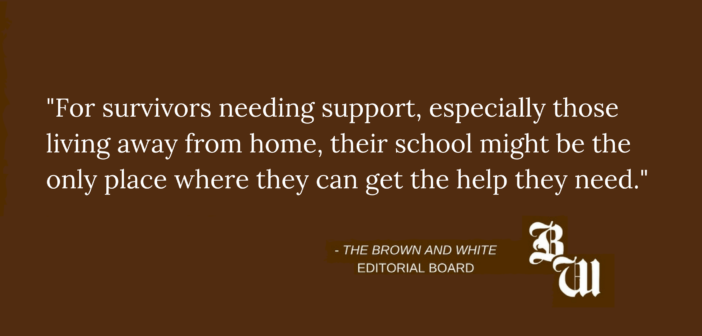“One rape is one too many.
One assault is one too many.
One aggressive act of harassment is one too many.
One person denied due process is one too many.”
That’s U.S. Secretary of Education Betsy Devos speaking about her intent to reduce the role of college institutions in Title IX procedures.
Title IX protects students from sex-oriented discrimination on any campus that receives federal aid. An additional “Dear Colleague” letter issued by President Obama in 2011 gave colleges the responsibility of conducting judicial processes regarding students’ sexual assault allegations.
Devos’ logic for rolling back Title IX isn’t unreasonable. When universities act as the judges and juries of sexual assault cases, fair criminal investigations can easily become unwound in a flurry of emotions that bypass objectivity and facts.
Innocent until proven guilty quickly turns into guilty until proven innocent.
Why, then, should it be the university’s job to enforce Title IX in the first place?
The answer lies in what should be, in a perfect world, the ultimate goal of Title IX — helping sexual assault survivors with whatever they need in whatever way they can.
On average, 6 percent of sexual assault cases result in false accusations.
When someone is sexually assaulted, their life is split into two halves: before and after.
Being assaulted isn’t just something that gets catalogued by the victim as a tragic life event to block out of their mind — it becomes their life.
Survivors’ habits change overnight. They might retract from relationships. They can develop mental disorders, some of which lead to self-harm or self-medication.
Without Title IX, the burden of speaking to authorities is placed upon survivors. Every word spoken to a police officer triggers memories of their assault in harrowing detail.
Stories of sexual assault are usually left out of the media to protect survivors’ identities. However, if an incident is major enough to be publicized, a survivor can become even more emotionally distraught.
If they don’t feel comfortable speaking to the police, how can they possibly open up to the press?
Universities provide a space where students can, hopefully, feel comfortable telling someone about their assault. For survivors needing support, especially those living away from home, their school might be the only place where they can get the help they need.
Maybe Title IX isn’t perfect. More consideration for the accused’s right to due process is certainly warranted. Maybe Devos’ idea of repealing and replacing Title IX will be a step in the right direction.
But repeal without replacement? Removing the responsibility from universities without placing it in the hands of more capable authorities?
That’s two steps backward.






Comment policy
Comments posted to The Brown and White website are reviewed by a moderator before being approved. Incendiary speech or harassing language, including comments targeted at individuals, may be deemed unacceptable and not published. Spam and other soliciting will also be declined.
The Brown and White also reserves the right to not publish entirely anonymous comments.
1 Comment
This “Opinion” is a poorly researched article.
First of all, Title IX diktats cover a vast array of issues in education of which the problem of sexual violence is one of them. See:
https://en.wikipedia.org/wiki/Title_IX#Impact_on_sexual_violence
The “Dear Colleague” letter was NOT issued and signed by President Obama. Rather, it was issued by Russlynn Ali, who was the Assistant Secretary for the Office of Civil Rights within the Department of Education.
Throughout the Obama administration, this office has displayed an appalling amount of governmental overreach.
Betsy DeVos intends to correct this problem. See:
http://www.mindingthecampus.org/2017/09/devos-new-focus-on-rights-of-the-accused/
This article has several clickable links buried in the text. Here are two of them that make for worthwhile reading:
https://www.theatlantic.com/education/archive/2017/09/the-uncomfortable-truth-about-campus-rape-policy/538974/
https://www.thefire.org/due-process-report-2017/
This second link has a table with The Fire’s Due Process ratings for the 53 top universities in the US News list. Lehigh scored with an “F” grade as to how it handles sexual misconduct cases. And a rather poor grade of “D” for how it handles other discipline problems.
Much of this has to do with the poor leadership of John Smeaton and his über liberal politically correct policies when he was head of Student Affairs.
Let’s hope Ricardo Hall takes a fresh look at Lehigh’s student conduct policies and cleans them up.
===
On a positive note, a look at Lehigh’s crime statistics at:
http://police.lehigh.edu/content/crime-statistics
indicates that sexual misconduct cases at Lehigh are minimal and almost nonexistent.